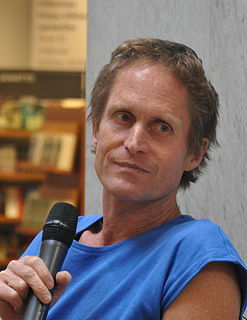A Quote by Peter Høeg
When we say 'time', I believe we mean at least two things. We mean changes. And we mean something unchangeable. We mean something that moves . but against an unmoving background. And vice versa.Animals can sense changes. But consciousness of time involves the double sense of constancy and change. Which can only be attributed to those who give expression to it. And that can only be done through language, and only man has language.The perception of time and language are inextricably bound up with one another.
Quote Topics
Related Quotes
I'm not just interested in the thoughts I have, but also in others' thoughts, and why not carry those forward? That's why American fiction can be so thin. All these fears, like not seeming to be original - I mean, hell, most stuff isn't. The question is whether you can articulate your thoughts for the moment in which you're living, which is a different time. Say them in a newer way. There are new events, and language changes - sensibilities change. We are writing in and of the time we're in. Oh, it's a weird time.
I mean, what's thematic? How to put it? Going back to, like, 1980, when I started writing poetry. Language itself became an issue. I'd even think about font as an aspect of text, you know, how something looks on a page. A lot of this is the product of a very solitary existence, it's like, language, I mean, you know. A lot of time spent alone in the creation of all of this stuff.
I have declared again and again that if I say Aryans, I mean neither blood nor bones, nor hair nor skull; I mean simply those who speak an Aryan language. In that sense, and in that sense only, do I say that even the blackest Hindus represent an earlier stage of Aryan speech and thought than the fairest Scandinavians. To me an ethnologist who speaks of Aryan race, Aryan blood, Aryan eyes and hair, is as great a sinner as a linguist who speaks of a dolichocephalic dictionary or a brachycephalic grammar.
Do the structures of language and the structures of reality (by which I mean what actually happens) move along parallel lines? Does reality essentially remain outside language, separate, obdurate, alien, not susceptible to description? Is an accurate and vital correspondence between what is and our perception of it impossible? Or is it that we are obliged to use language only in order to obscure and distort reality -- to distort what happens -- because we fear it?
Language changes. If it does not change, like Latin it dies. But we need to be aware that as our language changes, so does our theology change, particularly if we are trying to manipulate language for a specific purpose. That is what is happening with our attempts at inclusive language, which thus far have been inconclusive and unsuccessful.
There is something false in this search for a purely feminine writing style. Language, such as it is, is inherited from a masculine society, and it contains many male prejudices. We must rid language of all that. Still, a language is not something created artificially; the proletariat can't use a different language from the bourgeoisie, even if they use it differently, even if from time to time they invent something, technical words or even a kind of worker's slang, which can be very beautiful and very rich. Women can do that as well, enrich their language, clean it up.
Don't waste your time, do something worthwhile with it." But what can that mean: worthwhile? Finally to start realizing long-cherished wishes. To attack the error that there will always be time for it later....Take the long-dreamed-of trip, learn this language, read those books, buy yourself this jewelry, spend a night in that famous hotel. Don't miss out on yourself. Bigger things are also part of that: to give up the loathed profession, break out of a hated milieu. Do what contributes to making you more genuine, moves you closer to yourself.
Language is the primary way we communicate with each other, and we have really strong feelings about what words mean, and about good language and bad. Those things are really based on sort of an agglutination of half-remembered rules from high school or college, and our own personal views on language and the things we grew up saying, the things we grew up being told not to say.






































